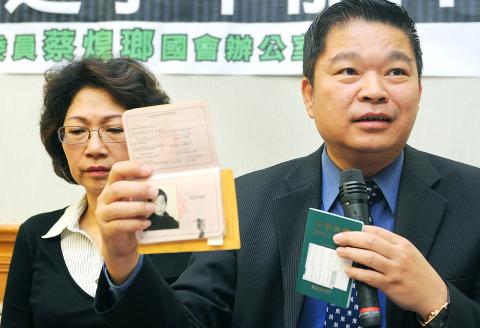The Ministry of Foreign Affairs (MOFA) yesterday promised to help a new university graduate who wants to serve in the military but is unable to do so because he holds dual nationality.
The man, surnamed Shih (施), who graduated from National Taiwan University earlier this year, has passed all phases of the testing process to enroll in a volunteer reserve officer training program but his application has been stalled because of the nationality issue, Democratic Progressive Party Legislator Tsai Huang-liang (蔡煌瑯) told a press conference.
Unlike the compulsory national service system in which all Republic of China (ROC) males living in Taiwan are required to serve even if they have dual nationality, those who wish to pursue a professional military career cannot hold a passport from another country.

PHOTO: LIAO CHEN-HUEI, TAIPEI TIMES
Born in Bolivia, Shih holds both Bolivian and ROC nationality. He came to Taiwan at the age of three and has never returned to Bolivia, Tsai said.
In 2008, Shih went to study in the US, traveling on his ROC passport, the legislator said.
Shih was recently instructed by the Ministry of National Defense to give up his Bolivian nationality by March 28 to be eligible to serve in accordance with the Nationality Act (國籍法), or face having his qualifications to enroll in the training program revoked, Tsai said.
However, the Bolivian government has said there is “no need” for Shih to give up his Bolivian citizenship because the country accepts dual citizenship. It has therefore refused to issue a verification document of Shih’s relinquishment of his Bolivian nationality, Tsai said.
Bai Chieh-lung (白捷隆), a human resources official at the Ministry of National Defense, said the military carries out its responsibilities in accordance with the law and that the law is clear that Shih must file evidence proving he has relinquished his Bolivian nationality.
Chen Shou-han (陳首翰), a MOFA legal official, said that Shih’s relinquishment of his Bolivian nationality could not be validated based only on unilateral recognition by Taiwan.
Chen added that the MOFA would instruct its representatives in Bolivia to gain an understanding of that country’s laws and seek ways to help Shih give up his Bolivian nationality.

Alain Robert, known as the "French Spider-Man," praised Alex Honnold as exceptionally well-prepared after the US climber completed a free solo ascent of Taipei 101 yesterday. Robert said Honnold's ascent of the 508m-tall skyscraper in just more than one-and-a-half hours without using safety ropes or equipment was a remarkable achievement. "This is my life," he said in an interview conducted in French, adding that he liked the feeling of being "on the edge of danger." The 63-year-old Frenchman climbed Taipei 101 using ropes in December 2004, taking about four hours to reach the top. On a one-to-10 scale of difficulty, Robert said Taipei 101

Nipah virus infection is to be officially listed as a category 5 notifiable infectious disease in Taiwan in March, while clinical treatment guidelines are being formulated, the Centers for Disease Control (CDC) said yesterday. With Nipah infections being reported in other countries and considering its relatively high fatality rate, the centers on Jan. 16 announced that it would be listed as a notifiable infectious disease to bolster the nation’s systematic early warning system and increase public awareness, the CDC said. Bangladesh reported four fatal cases last year in separate districts, with three linked to raw date palm sap consumption, CDC Epidemic Intelligence

US climber Alex Honnold left Taiwan this morning a day after completing a free-solo ascent of Taipei 101, a feat that drew cheers from onlookers and gained widespread international attention. Honnold yesterday scaled the 101-story skyscraper without a rope or safety harness. The climb — the highest urban free-solo ascent ever attempted — took just more than 90 minutes and was streamed live on Netflix. It was covered by major international news outlets including CNN, the New York Times, the Guardian and the Wall Street Journal. As Honnold prepared to leave Taiwan today, he attracted a crowd when he and his wife, Sanni,

Taiwanese and US defense groups are collaborating to introduce deployable, semi-autonomous manufacturing systems for drones and components in a boost to the nation’s supply chain resilience. Taiwan’s G-Tech Optroelectronics Corp subsidiary GTOC and the US’ Aerkomm Inc on Friday announced an agreement with fellow US-based Firestorm Lab to adopt the latter’s xCell, a technology featuring 3D printers fitted in 6.1m container units. The systems enable aerial platforms and parts to be produced in high volumes from dispersed nodes capable of rapid redeployment, to minimize the risk of enemy strikes and to meet field requirements, they said. Firestorm chief technology officer Ian Muceus said